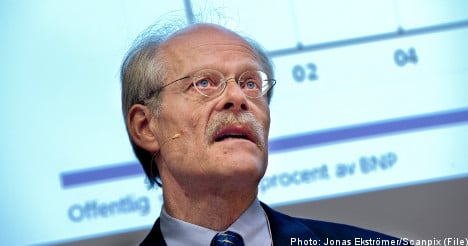“The weak developments in the euro area are clearly affecting the Swedish economy, which is now slowing down,” the Riksbank said in a statement.
It also noted that Swedes are spending less money, wages are not expected to increase at their usual rate, and unemployment has risen, all combining to create “low inflationary pressure”.
Sweden has a 2-percent inflation target.
“Swedish households and companies now have a more gloomy outlook, and consumption and investment are weak,” the statement read.
The governing board, however, hopes that Tuesday’s interest rate cut will keep Sweden on target inflation-wise all the way to 2014. It does not expect to alter the repo rate further during 2013.
Two of the bank’s six governors, however, wanted an even heftier cut.
Karolina Ekholm wanted the Riksbank to cut the repo rate down to 0.75 percent in early 2013 and communicate its intentions to do so now.
Lars E.O. Svensson wanted a similar cut to be put in place immediately and not wait for the New Year.
There were also outside critics who said the Riksbank should have acted more decisively and more swiftly during 2012.
“There is a lot to support an argument that the interest rate we had negatively affected the economy and has contributed to unemployment,” John Hassler, economics professor at Stockholm University, told TT.
Hassler does not think Tuesday’s cut will have any great effect as most players in the market had already forecast the rate cut and made adjustments accordingly.
The Riksbank also lowered its forecast for Swedish economic growth in 2013 to 1.2 percent, down from the previous forecast of 1.8 percent. The bank expects economic growth to pick up in 2014, however, rising to 2.7 percent.
Unemployment, according to the Riksbank, is expected to rise to 8.1 percent next year, slightly higher than the bank’s earlier forecast of 7.9 percent, before falling to 7.6 percent in 2014.
TT/The Local/at



 Please whitelist us to continue reading.
Please whitelist us to continue reading.
Member comments